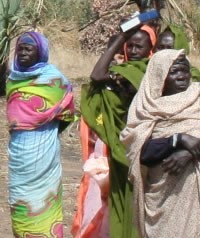Tira in Sudan

Photo Source:
Stan Fikes
|
Send Joshua Project a map of this people group.
|
| People Name: | Tira |
| Country: | Sudan |
| 10/40 Window: | Yes |
| Population: | 40,000 |
| World Population: | 40,000 |
| Primary Language: | Tira |
| Primary Religion: | Islam |
| Christian Adherents: | 2.00 % |
| Evangelicals: | 0.40 % |
| Scripture: | Complete Bible |
| Ministry Resources: | Yes |
| Jesus Film: | Yes |
| Audio Recordings: | Yes |
| People Cluster: | Nuba Mountains |
| Affinity Bloc: | Sub-Saharan Peoples |
| Progress Level: |
|
Introduction / History
The Nuba people claim to be the original inhabitants of the Nuba Mountains which are located in Sudan's South Kordofan province. Since other groups occupy the area, such as the Arabic-speaking Bagarra and Jellaba, the non-Arab Nuba make up less than two-thirds of the Nuba Mountains population. Although the people are referred to as "Nuba," there is no single Nuba group. Instead, the term is used as a regional grouping for a people who share the same environment and stand out as distinct from the surrounding tribes. One of the Nuba tribes is the Tira people.
There are nearly 100 dialects are spoken in the Nuba Hills. This results to one community being unable to understand the next. Fortunately, many Nuba speak Sudanese Arabic as a second language, which has enabled them to communicate with other groups.
For many centuries, the Nuba Mountains served as a refuge for peoples fleeing oppressive governments and slave traders. Perhaps this best explains why there is such a variety of Nuba groups and languages.
What Are Their Lives Like?
Because the Tira tribe originally fled to the Mountains for refuge, they generally dislike and distrust outsiders. While most tribes still live in the Nuba Mountains, some individuals have migrated to the surrounding hills and plains since the late 1800s. Others have even moved to towns and cities, either permanently or seasonally, in search of jobs or schools for their children. This gradual migration is the result of the British establishing law and order around the tribes, making them feel safe from outside influences. The introduction of cotton as a cash crop has also encouraged some individuals to move southward.
The Tira are industrious farmers and their livelihood is based primarily on agriculture. Sorghum, the staple crop, can either be sold or made into beer. Millet, sesame, peanuts, and tobacco are grown for personal consumption. The Tira also gather forest products and sell them as some of the region's exports. Even the women have small vegetable gardens in which they raise vegetables such as onions, okra, beans, and maize. The Tira also keep cattle, sheep, goats and chickens.
Millet porridge is a main part of the Tira diet. It is served with a sauce made from meat, okra, or kidney beans. Dura, a thin, coarse bread, was introduced to the Nuba Mountains by the neighboring Arab groups. Today, it has become one of their staple foods. Dura can also be used to make a mild beer. The Tira who have migrated into cities now enjoy eating bread from bakeries, fresh meat, and fresh produce, leaving their desire for millet porridge behind.
Individual Tira communities vary in size. Some groups live in smaller villages with only a thousand inhabitants. Other groups have combined with the neighboring villages, forming communities of up to 50,000.
A typical Tira home is made of either stone or plaster-covered thatch. Each home has a kitchen, sleeping quarters and a granary. Some houses also have special rooms where the unmarried girls of the neighborhood sleep.
Village communities are organized by clans or extended family sections. The authority of the village is left in the hands of the clan elders. Each community usually has a large, stone mosque. Most villages also have Islamic schools where young boys and girls are sent to study the Koran.
What Are Their Beliefs?
Like other Nuba tribes, the Tira are completely Muslim and allow Islamic law to shape their daily lives. Although one group is different from the next in language, ethnicity, and cultural heritage, the laws of Islam bind them in education, dress, diet, family life and spiritual life. In accordance with Islamic tradition, Tira children are educated in religious schools; men and women wear robes; pork is not eaten; other meats may only be eaten when slaughtered for sacrifice; all boys are circumcised; husbands are permitted to have as many as four wives; and common prayers are said regularly.
What Are Their Needs?
The Tira people have few Christian resources in their languages. They need prayerful intercession.
Prayer Points
Ask God to raise up prayer teams who will begin breaking up the spiritual soil of Sudan through worship and intercession.
Pray that missions agencies and churches will accept the challenge of adopting and reaching the Nuba tribes.
Ask the Lord to raise up long-term Christian workers who will go to Sudan and work among the Tira.
Pray that the Tira believers will have the boldness to share Christ with their own people.
Ask the Lord to save key leaders among the Nuba who will boldly declare the gospel.
Pray that strong local fellowships of believers will be planted among each of the Nuba tribes.